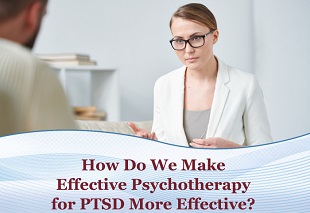PTSD: National Center for PTSD
How Do We Make Effective Psychotherapy for PTSD More Effective?
Continuing Education
This section brings together free in-depth Continuing Education resources for the Professional community concerned with trauma.
How Do We Make Effective Psychotherapy for PTSD More Effective?
- Date Created: 10/ 8/2020
- Time to Complete: 1 hour
- Credits: ANCC, APA, ASWB, ACCME, Other Orgs
- Skill Level: Intermediate
- Course Series: PTSD 101
 Author(s):
Author(s):
Description
In Veterans, insomnia has been shown to have direct and indirect associations with suicidal ideation, attempts and death. Insomnia symptoms may be associated with increased symptoms of PTSD and depression and associated with increased suicidal ideation.
Recent clinical practice guidelines (CPGs) for PTSD treatment, including the 2017 VA/DoD CPG, are based upon scientific evidence rather than consensus. Knowledge of the methodological considerations for interpreting the scientific literature on psychotherapy is important for developing recommendations for evidence-based care. This course reviews the VA/DoD CPG recommendations and provides an overview of the relative effectiveness, dropout rates and remission rates of PTSD treatments compared to other disorders (e.g., depression).
In addition to listing areas of emerging science in PTSD psychotherapy, this course offers a heuristic model for the process of improving PTSD treatment outcomes and potential strategies for enhancing treatment effectiveness.
Goals and Objectives
- Describe PTSD clinical practice recommendations and guidelines
- Analyze meta-analytic findings on PTSD treatment
- Compare PTSD psychotherapy outcomes with treatment outcomes in other disorders
- Identify at least 2 potential strategies for enhancing treatment effectiveness


























